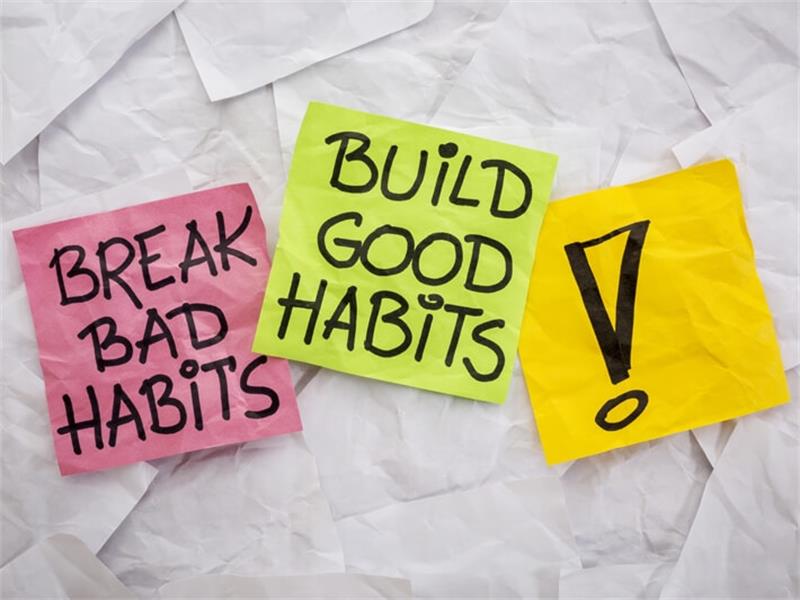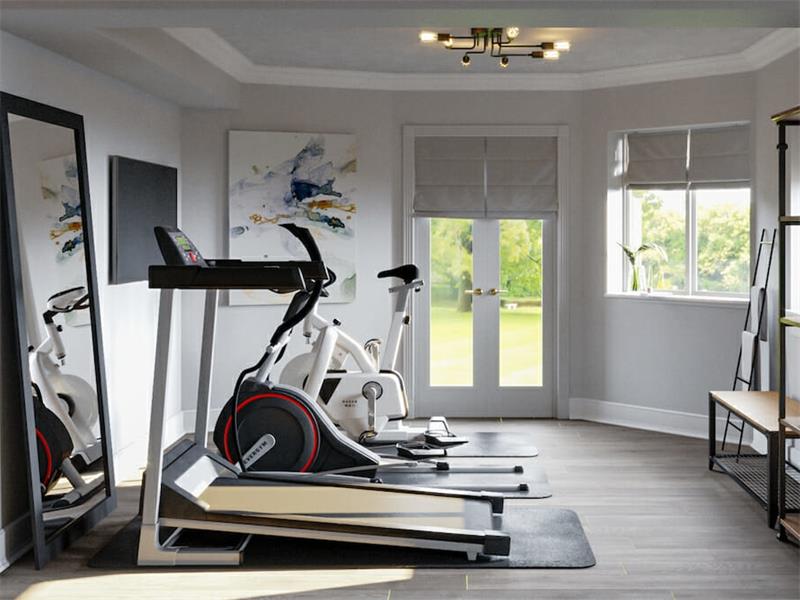Contents
- 1 Why Building Better Habits is Crucial for a Healthier Life
- 2 Identify Your Goals
- 3 Start Small: Build Momentum and Confidence with Small, Achievable Changes
- 4 Create a Routine
- 5 Stay Accountable
- 6 Acknowledge and Celebrate Your Successes
- 7 Overcome ObstaclesSubtopic 1: Identify potential obstacles
- 8 Incorporate Mindfulness
- 9 Prioritize Self-Care
- 10 Conclusion
Why Building Better Habits is Crucial for a Healthier Life
Most of us have heard the phrase “You are what you eat.” While that’s certainly true, it’s not the only factor that determines our overall health and well-being. Our daily habits – from how we move our bodies to how we manage stress – have a significant impact on our long-term health outcomes.
The good news is that building better habits doesn’t have to be difficult or overwhelming. Small changes can add up over time, leading to significant improvements in your physical, emotional, and mental health.
The Importance of Building Better Habits
The benefits of building better habits are wide-ranging and well-documented. For example, regular exercise can help reduce the risk of chronic diseases like heart disease and type 2 diabetes.
Eating a healthy diet can boost energy levels, improve digestion, and lower inflammation in the body. Getting enough sleep can improve mood, cognitive function, and immune system function.
But beyond these physical benefits, building better habits can also lead to greater happiness and fulfillment in life. When we prioritize self-care activities like exercise or meditation, we’re more likely to feel calmer, more centered, and more resilient in the face of stressors.
The Challenges of Building Better Habits
Of course, even though we know that building better habits is important for our overall health and well-being, it’s not always easy to put these changes into practice. There are countless obstacles that can get in the way – from lack of motivation or time constraints to environmental barriers like convenience foods or sedentary work environments.
But even with these challenges in mind, it’s important to remember that building better habits is possible for anyone – regardless of their current lifestyle or circumstances. By starting small with achievable goals and seeking support when needed (more on this later!), anyone can create positive change in their lives and reap the rewards of a healthier, happier future.
Identify Your Goals
Determine what you want to achieve
Before you start building better habits, it’s important to identify your goals. What do you want to achieve? Do you want to lose weight, reduce stress, or improve your overall health?
Whatever your goals may be, it’s crucial to write them down and make them specific. For example, instead of saying “I want to exercise more,” try setting a goal of “I will exercise for 30 minutes every day.”
Why is it important?
Identifying your goals helps give you direction and purpose. When you have a clear picture of what you want to achieve, it’s easier to stay motivated and focused on building better habits that align with those goals. Additionally, setting specific goals allows you to measure progress along the way.
The SMART Method
One effective way of identifying your goals is by using the SMART method. This involves making sure your goals are Specific, Measurable, Achievable, Relevant, and Time-bound.
By following this framework, you can ensure that your goals are realistic and attainable while also challenging yourself. For example: Instead of saying “I want to eat healthier,” try setting a SMART goal like “I will eat at least five servings of fruits and vegetables every day for the next month.” This goal is specific (five servings), measurable (counting servings), achievable (realistic amount), relevant (supports healthy eating), and time-bound (one month).
Once you’ve identified your goals using the SMART method or another approach that works for you, keep them visible as a reminder of what you’re working towards. With clear objectives in mind, building better habits becomes much more manageable.
Start Small: Build Momentum and Confidence with Small, Achievable Changes
Building better habits is a process that requires patience, persistence, and determination. One of the biggest mistakes people make when starting a new habit is to try to do too much too soon. While it’s important to have big goals and aspirations, it’s equally important to break those goals down into smaller, more manageable steps.
When you start small with achievable changes, you build momentum and confidence that can carry you through the tougher times. Think about it like climbing a staircase: if you try to leap up several steps at once, you’re likely to stumble or fall.
But if you take one step at a time, each success builds upon the last until you reach your destination. So what does “starting small” look like?
It depends on your goal, but some examples might include: – Drinking an extra glass of water each day
– Going for a 10-minute walk after lunch – Adding one serving of vegetables to your dinner plate
– Meditating for just two minutes before bed The key is to choose something that feels achievable but also moves you in the direction of your larger goal.
The Power of Tiny Habits
One concept that has gained popularity in recent years is the idea of “tiny habits.” This approach was developed by behavior scientist BJ Fogg and involves breaking down habits into their tiniest components. For example, instead of committing to doing 50 pushups every day (which can feel daunting), start with just two pushups after brushing your teeth in the morning. The idea is that by starting with something so small and easy, it becomes almost automatic—and over time, those tiny actions can add up to big results.
Tracking Your Progress
Another way to start small is by tracking your progress. This can be as simple as putting a checkmark on a calendar each time you complete your new habit or using an app like Habitica or Streaks to track your progress digitally.
Tracking your progress not only helps you see how far you’ve come, but also provides a sense of accountability and motivation. When you see that string of checkmarks or that streak of completed habits, it can be a powerful reminder of what you’re capable of—and inspire you to keep going.
Create a Routine
Establish a Consistent Routine that Aligns with Your Goals
Building better habits requires consistency, and establishing a routine that aligns with your goals is crucial. By creating this routine and sticking to it, you can build momentum and make lasting changes to your behavior. Your routine should include specific actions that support your goals, such as exercise, healthy eating, or self-care activities.
One way to create a routine is to start by identifying the habits you want to build and breaking them down into small, achievable steps. For example, if you want to start exercising regularly, begin by committing to a 10-minute walk each day.
Gradually increase the duration and intensity of your walks until they become a habit. Over time, this routine will become second nature.
Another key element of creating a routine is establishing specific times for each activity. This helps you stay on track and ensures that you have enough time for all the actions necessary to achieve your goals.
Set aside time in the morning or evening for self-care activities such as meditation or journaling. In addition to setting specific times for each activity, it’s important to be flexible and adjust your schedule as needed.
Life can be unpredictable at times, so having some flexibility in your routine can help you stay on track even when unexpected events occur. By establishing a consistent routine that aligns with your goals while also being flexible enough to adapt when necessary, you’ll be well on your way towards building better habits for a healthier life!
Stay Accountable
One of the biggest challenges, when we try to build better habits, is sticking with them. It can be difficult to stay motivated and focused, especially when we face obstacles or setbacks.
This is where accountability comes in. When we have someone or something to hold us accountable, it becomes easier to stay on track and achieve our goals.
Find an Accountability Partner
An accountability partner is someone who helps you stay committed and on track towards your goals. This could be a friend, family member, or colleague who is also interested in making positive changes in their life.
The key is to choose someone who will support and encourage you, but who will also hold you responsible for your actions. You can set up regular check-ins with your accountability partner – either in person or over the phone – to discuss progress and challenges.
You can also share your successes and celebrate milestones together. Knowing that you have someone else invested in your success can be a powerful motivator.
Use Technology to Track Progress
If finding an accountability partner isn’t feasible, there are plenty of technology tools that can help keep you on track towards your goals. For example, there are apps designed specifically for habit tracking that allow you to set reminders and monitor progress over time. You can also use social media as a form of public accountability by sharing updates about your progress with friends or followers online.
This not only helps keep you accountable but may inspire others as well. No matter how you choose to stay accountable, remember that it’s important to have a support system in place as you work towards building better habits for a healthier life.
Acknowledge and Celebrate Your Successes
Building better habits can be a challenging process and it’s important to take the time to acknowledge and celebrate your successes, no matter how small they may seem. Celebrating your accomplishments helps to reinforce positive behaviors while building confidence and motivation as you work towards your goals.
The Importance of Celebrating Milestones
When it comes to building better habits, progress is the name of the game. And celebrating milestones along the way, no matter how small they may be, is a powerful way to stay motivated and focused on your goals. Whether it’s completing a week of consistent exercise or sticking to a healthy eating plan for an entire month, acknowledging these achievements helps keep you committed and dedicated to building better habits in the long term.
It’s important not only to recognize what you’ve accomplished but also why it matters. Take some time to reflect on what achieving this milestone means for you and your overall health goals.
Did you have more energy? Sleep better?
Experience less stress? Understanding why each milestone matters can help reinforce positive behaviors while strengthening your resolve as you continue on this journey towards a healthier life.
How to Celebrate Your Successes
Celebrating success doesn’t have to be elaborate or expensive. In fact, sometimes the simplest celebrations can be the most meaningful.
Here are some ideas: – Write down your accomplishment in a journal: Keep track of all the milestones you achieve along the way in a dedicated journal.
Not only does this help remind you of all that you’ve accomplished but looking back at past successes can help motivate you when times get tough. – Treat yourself: Reward yourself with something that makes you feel good for each milestone achieved – such as buying yourself something special or indulging in a favorite hobby.
– Share with others: Share your success with friends or family who will support and encourage your progress. This can be a great way to build accountability, gain a fresh perspective and receive motivation from those closest to you.
Remember, building better habits is a long-term process. Celebrating milestones along the way helps to reinforce positive behaviors while strengthening your resolve as you work towards your ultimate health goals.
Overcome ObstaclesSubtopic 1: Identify potential obstacles
When it comes to building better habits, there are always going to be obstacles. Some of these obstacles may be external, such as a hectic work schedule or lack of access to healthy food options.
Other obstacles might be internal, like negative self-talk or lack of motivation. The first step in overcoming these obstacles is to identify them.
Take some time to reflect on what might get in the way of you sticking to your new habit. Are there certain times of day when you struggle the most?
What triggers your cravings or urges? Once you have a better understanding of what might derail your progress, you can start developing strategies for overcoming those barriers. Subtopic 2: Develop strategies
Now that you’ve identified potential obstacles, it’s time to develop strategies for overcoming them. One effective strategy is to plan ahead and anticipate challenges before they come up.
For example, if you know that you tend to snack on unhealthy foods when you’re stressed at work, make sure to pack healthy snacks and have them readily available. Another strategy is to enlist the support of others.
Whether it’s a friend who shares your goal or a coach who can provide guidance and accountability, having someone in your corner can make all the difference. Don’t forget the power of positive self-talk.
When faced with an obstacle or setback, it’s easy to fall into negative thought patterns that can derail our progress. Instead, focus on positive affirmations and remind yourself why this habit is important to you. Subtopic 3: Stay flexible
No matter how well we plan ahead and prepare for potential obstacles, life has a way of throwing us curveballs. That’s why it’s important to stay flexible and adapt as needed.
If something isn’t working for you, don’t be afraid to try a different approach. Maybe your initial goal was too ambitious or you need to adjust your routine to better fit your lifestyle.
Remember, building better habits is about progress, not perfection. By identifying potential obstacles, developing strategies for overcoming them, and staying flexible along the way, you can overcome even the toughest challenges and build habits that will last a lifetime.
Incorporate Mindfulness
Stay Present and Focused on Your Goals
When building new habits, it can be easy to become overwhelmed by the changes you are trying to make. Incorporating mindfulness practices can help you stay present and focused on your goals.
Mindfulness is the practice of being fully present and engaged in the current moment, which can help reduce stress and anxiety while increasing overall well-being. A great way to start incorporating mindfulness into your daily routine is by practicing mindfulness meditation.
This involves sitting quietly for a few minutes each day and focusing on your breath or a specific mantra. As thoughts come up, simply acknowledge them and let them go without judgment or attachment.
Over time, this practice can help increase focus, reduce stress levels, and improve overall mental clarity. Another way to practice mindfulness is by being more aware of your surroundings throughout the day.
Instead of multitasking or rushing through activities, take time to appreciate the sensations around you. Notice the smells, sounds, and textures of your environment as you move through your daily tasks.
This will help bring you back into the present moment and increase overall awareness. In addition to formal meditation practices and increased awareness throughout the day, there are many other ways to incorporate mindfulness into your life.
For example, you might try mindful eating by savoring each bite of food slowly rather than rushing through meals distractedly. Or perhaps during a workout or exercise routine focus solely on breathing properly during each movement with full attention given towards executing each with precision.
By incorporating mindfulness practices into your daily routine, you will begin to develop greater self-awareness while improving mental clarity as well as long-term decision-making skills. These benefits will not only enhance existing goals related better habits but also allow for greater self-reflection leading towards further personal growth in all aspects of life over time!
Prioritize Self-Care
The Importance of Self-Care
Self-care is often overlooked as a crucial component of building healthy habits. However, prioritizing self-care can have a significant impact on your overall wellbeing. Engaging in activities that support your physical, emotional, and mental health can help you feel more energized, refreshed, and centered.
When we neglect self-care, we may experience symptoms such as stress, burnout, and even physical illness. Prioritizing self-care allows us to recharge our batteries and better manage the demands of daily life.
Physical Self-Care
Physical self-care involves nurturing your body through healthy habits like exercise, nutrition, and sleep. Exercise helps to reduce stress levels by releasing endorphins that improve mood and energy levels.
Eating a balanced diet provides the necessary nutrients for our bodies to function properly. Sleep is crucial for physical health as it allows our bodies time to repair and regenerate.
Incorporate physical self-care into your routine by starting with small changes like going for a walk during lunch breaks or increasing daily water intake. As you build momentum with these small changes, incorporate more significant habits like regular exercise or meal planning.
Emotional & Mental Self-Care
Emotional self-care involves caring for our emotional needs through activities like journaling or spending time with loved ones. Mental self-care involves engaging in activities that support cognitive health such as reading or meditation. Prioritizing emotional and mental self-care can help reduce stress levels by giving you an outlet to express emotions or unwind from daily demands.
Activities like meditation can also improve focus and productivity by training the brain to be more present in the moment. Try incorporating emotional and mental self-care activities into your routine by scheduling them into your calendar or setting reminders on your phone.
Taking care of yourself should always be a top priority. By incorporating physical, emotional, and mental self-care into your routine, you can build better habits that support a healthier, happier lifestyle.
Conclusion
Building better habits for a healthier life is a journey that takes time and effort, but the rewards are worth it. By identifying your goals, starting small, creating a routine, staying accountable, celebrating successes, overcoming obstacles, incorporating mindfulness, and prioritizing self-care you can achieve your aspirations for better health. Remember that building habits is not about perfection but progress.
Each positive choice you make is a step in the right direction. Celebrate the small victories along the way to stay motivated and inspired.
Use setbacks as learning opportunities to adjust your approach and keep moving forward. By implementing these strategies into your daily life you will begin to notice positive changes in both your physical and mental health.
You will feel more energized, focused, and content with your overall well-being. Don’t let fear or doubt hold you back from achieving your full potential for a healthier life.
You have the power to create lasting change in your life by building better habits. Take action today towards living a happier and healthier future!












